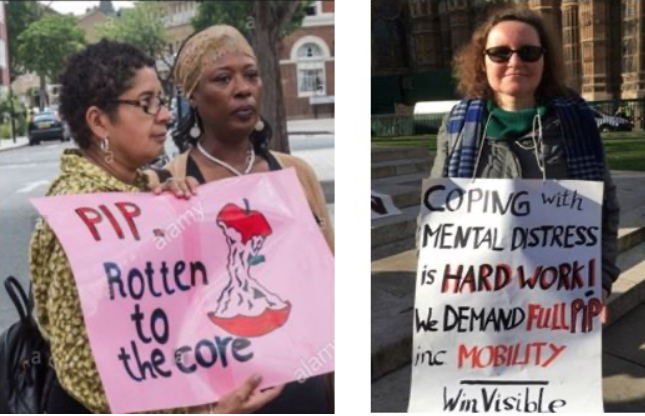WinVisible supported Ms S, a woman with end-stage kidney failure on dialysis, in her fight to get full PIP. We helped cut through the DWP’s resistance, who were pressuring her to accept less than she actually needs. She won over £4,000 backdated benefit.
Ms S says: “I can’t thank T and C enough for all the support they have given me over my PIP review. I was certain I wasn’t going to win this, and it caused me a lot of stress. They guided and supported me through the whole process. Although I’m very ill, my life has been made easier without the worry of this hanging over me. Thanks so much… WinVisible and these ladies are amazing.”
Ms S was previously getting standard daily living and standard mobility rates of PIP. When she filled in her PIP review form, she applied for the high rates as her health has got worse.
We were shocked that the DWP refused her, despite Ms S having among the highest needs that we know of, among disabled women in a range of situations.
We supported her with mandatory reconsideration of the DWP decision, which is when they have to look at it again. Together we asked her MP to take up the way she and her answers were treated.
At reconsideration, the DWP agreed daily living component at enhanced rate. But for mobility, they scored her 0 for planning and following journeys, so she was still refused the enhanced rate. They did not accept that she struggles to go out and to cope with journeys. Ms S told them:
‘When I am going to my hospital appointment [dialysis], I feel very anxious and I need someone with me even though this is a familiar journey. I struggle to take in information such as signs. I usually take a cab and my brother or my daughter comes with me. Now I can’t go on an unfamiliar journey due to anxiety and fear that I could become unwell and would be unable to get home safely.
Some of the time I don’t want to leave home because it feels too stressful to deal with the outside world. I have missed a lot of social occasions and birthday celebrations that I have been invited to because it feels too overwhelming.’
The DWP was still refusing enhanced mobility rate, and notified Ms S that she would have to go to tribunal. We helped her to lodge her appeal, to keep her dispute going. But it was unjust and unacceptable to force Ms S to go to appeal. And the wait for appeal is six to nine months or even longer. All that time, you have the stress of it hanging over you. To cut through the system, we continued to take it up via her MP’s caseworker. This way, she avoided having to go to tribunal — which was too much for her and she would have dropped it, if she was forced to go further.
We know about PIP mobility enhanced rate based on overwhelming psychological distress, as we supported the successful legal challenge in 2017. We met and supported Ms RF at the High Court, along with other organisations. The High Court ruled that it was discriminatory to deny claimants with mental distress the higher rate of PIP mobility on the basis that their need was mental not physical. PIP is supposed to be based on needs, not what disability you have, but how it affects you. The court ordered that the DWP should trawl through and review other PIP claimants who may have been denied enhanced rate.
With the involvement of her MP caseworker, we pressed the DWP on Ms S’s entitlement to the enhanced mobility component due to anxiety.
- Her GP had written that ‘she requires considerable ongoing input and support and it impacts on her mobility and mental health also’.
- The DWP had medical records showing that Ms S takes medication for angina (heart condition causing chest pains), but the DWP failed to take this into account connected to planning and following journeys: increased heart rate from the stress of undertaking a journey can exacerbate her angina and contribute to overwhelming psychological distress.
We also wrote in support: “Due to the fragility of Ms S’s health, her fatigue and dialysis regime, there is a limit to how much effort she is able to or wishes to put into the appeal process . . . She should not be forced to give up.”
After that, the DWP conceded without any tribunal, and awarded Ms S the highest PIP from the date of the review!
She says: “I was awarded over £4,000 in back pay, which I am extremely grateful and happy about. In this current climate it has helped a lot”.


Thank you winvisible! My loved one was also in end stage kidney failure, on dialysis, and has T1 diabetes. Luckily she was awarded enhanced/enhanced PIP after assessment! She has since had her transplant and is recovering, slowly, but steadily.
Disgusting treatment of Ms S by DWP. Having witnessed my loved one’s life for the past 4 years, how could DWP possibly deny Ms S full PIP?!